Fleurs du Mal Magazine


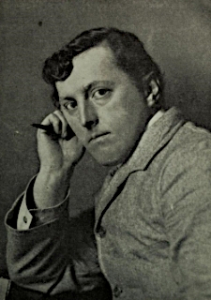
A Dream
My dead love came to me, and said,
‘God gives me one hour’s rest,
To spend with thee on earth again:
How shall we spend it best?’
‘Why, as of old,’ I said; and so
We quarrell’d, as of old:
But, when I turn’d to make my peace,
That one short hour was told.
Stephen Phillips
(1864 – 1915)
A Dream
• fleursdumal.nl magazine
More in: #Editors Choice Archiv, Archive O-P, Archive O-P
Exquisitely sharp, deeply humane and brutally hilarious, Toy Fights is a future classic from one of the greatest writers of his generation.
 This is a book about family, money and music but also about schizophrenia, hell, narcissists, debt and the working class, anger, swearing, drugs, books, football, love, origami, the peculiar insanity of Dundee, sugar, religious mania, the sexual excesses of the Scottish club band scene and, more generally, the lengths we go to not to be bored.
This is a book about family, money and music but also about schizophrenia, hell, narcissists, debt and the working class, anger, swearing, drugs, books, football, love, origami, the peculiar insanity of Dundee, sugar, religious mania, the sexual excesses of the Scottish club band scene and, more generally, the lengths we go to not to be bored.
Don Paterson was born in Dundee, Scotland, in 1963. He spent his boyhood on a council housing estate.
When he wasn’t busy dreading his birthdays, dodging kids who wanted to kill him in a game of Toy Fights, working with his country-and-western singer dad, screwing up in the Boys’ Brigade, obsessing over God, origami, The Osmonds, stamps, sex or Scottish football cards, he was developing a sugar addiction, failing his exams, playing guitar, falling in love, dodging employment and descending into madness.
While he didn’t manage to figure out who he was meant to be, the first twenty years of his life – before he took a chance, packed his guitar and boarded a train to London – did, for better or worse, shape who he would become.
Don Paterson was born in Dundee in 1963. His previous poetry collections include Nil Nil, God’s Gift to Women, Landing Light, Rain and 40 Sonnets. He has also published two books of aphorism, as well as translations of Antonio Machado and Rainer Maria Rilke. His poetry has won many awards, including the Whitbread Poetry Prize, the Geoffrey Faber Memorial Prize and all three Forward Prizes; he is currently the only poet to have won the T. S. Eliot Prize twice. He was awarded the Queen’s Gold Medal for Poetry in 2009. He is a Fellow of the Royal Society of Literature, the English Association and the Royal Society of Edinburgh, and is currently Professor of Poetry at the University of St Andrews. Since 1997 he has been poetry editor at Picador Macmillan, and he also works as a jazz musician and composer. He lives in Edinburgh.
Toy Fights: A Boyhood
by Don Paterson (Author)
Memoir
Publisher: Liveright
July 11, 2023
Language: English
Hardcover: 384 pages
ISBN-10: 1324093625
ISBN-13: 978-1324093626
$27.95
• fleursdumal.nl magazine
More in: #Biography Archives, - Book News, - Bookstores, Archive O-P, Archive O-P, Art & Literature News
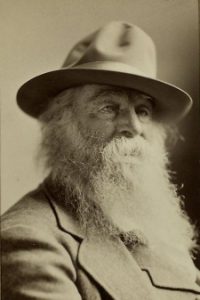
Look Down, Fair Moon
Look down, fair moon, and bathe this scene;
Pour softly down night’s nimbus floods,
on faces ghastly, swollen, purple;
On the dead, on their backs, with their arms toss’d wide,
Pour down your unstinted nimbus, sacred moon.
Walt Whitman
(1819 – 1892)
Look Down, Fair Moon
• fleursdumal.nl magazine
More in: Archive W-X, Archive W-X, Whitman, Walt
 From New York Times bestselling author, r.h. Sin, comes a care package of two new poetry and prose collections boxed together in an elegant slipcase.
From New York Times bestselling author, r.h. Sin, comes a care package of two new poetry and prose collections boxed together in an elegant slipcase.
R.H. Sin is a New York Times bestselling author of poetry books.
He lives in New York with his wife, poet Samantha King Holmes, and two kids.
I Hope She Finds This
by r.h. Sin (Author)
Publisher: Andrews McMeel Publishing
Dec 13 2022
Language: English
Paperback: 360 pages
ISBN-10: 1524871133
ISBN-13: 978-1524871130
$29.49
• fleursdumal.nl magazine
More in: #Editors Choice Archiv, - Book News, - Bookstores, Archive S-T, Archive S-T
From the UK Poet Laureate and bestselling translator, a spirited book that demystifies and celebrates the art of poetry today
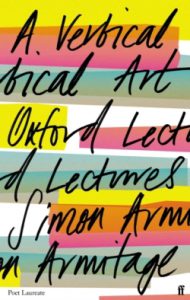 In A Vertical Art, acclaimed poet Simon Armitage takes a refreshingly common-sense approach to an art form that can easily lend itself to grand statements and hollow gestures. Questioning both the facile and obscure ends of the poetry spectrum, he offers sparkling new insights about poetry and an array of favorite poets.
In A Vertical Art, acclaimed poet Simon Armitage takes a refreshingly common-sense approach to an art form that can easily lend itself to grand statements and hollow gestures. Questioning both the facile and obscure ends of the poetry spectrum, he offers sparkling new insights about poetry and an array of favorite poets.
Based on Armitage’s public lectures as Oxford Professor of Poetry, A Vertical Art illuminates poets as varied as Emily Dickinson, Walt Whitman, Marianne Moore, W. H. Auden, Ted Hughes, Thom Gunn, A. R. Ammons, and Claudia Rankine.
The chapters are often delightfully sassy in their treatment, as in “Like, Elizabeth Bishop,” in which Armitage dissects―and tallies―the poet’s predilection for similes.
He discusses Bob Dylan’s Nobel Prize, poetic lists, poetry and the underworld, and the dilemmas of translating Sir Gawain and the Green Knight. Armitage also pulls back the curtain on the unromantic realities of making a living as a contemporary poet, and ends the book with his own list of “Ninety-Five Theses” on the principles and practice of poetry.
An appealingly personal book that explores the volatile and disputed definitions of poetry from the viewpoint of a practicing writer and dedicated reader, A Vertical Art makes an insightful and entertaining case for the power and potential of poetry today.
A Vertical Art: On Poetry
by Simon Armitage (Author)
Publisher Princeton University Press
Section Poetry Criticism
Paperback
ISBN 9780691233109
May 24, 2022
Paperback
$22.95
• fleursdumal.nl magazine
More in: - Book News, - Bookstores, Archive A-B, Archive A-B, Armitage, Simon

Recitative
Regard the capture here, O Janus-faced,
As double as the hands that twist this glass.
Such eyes at search or rest you cannot see;
Reciting pain or glee, how can you bear!
Twin shadowed halves: the breaking second holds
In each the skin alone, and so it is
I crust a plate of vibrant mercury
Borne cleft to you, and brother in the half.
Inquire this much-exacting fragment smile,
Its drums and darkest blowing leaves ignore,–
Defer though, revocation of the tears
That yield attendance to one crucial sign.
Look steadily–how the wind feasts and spins
The brain’s disk shivered against lust. Then watch
While darkness, like an ape’s face, falls away,
And gradually white buildings answer day.
Let the same nameless gulf beleaguer us–
Alike suspend us from atrocious sums
Built floor by floor on shafts of steel that grant
The plummet heart, like Absalom, no stream.
The highest tower,–let her ribs palisade
Wrenched gold of Nineveh;–yet leave the tower.
The bridge swings over salvage, beyond wharves;
A wind abides the ensign of your will . . .
In alternating bells have you not heard
All hours clapped dense into a single stride?
Forgive me for an echo of these things,
And let us walk through time with equal pride.
Hart Crane
(1889 – 1932)
Recitative
• fleursdumal.nl magazine
More in: Archive C-D, Archive C-D, Crane, Hart
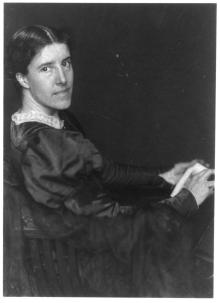
Women Do Not Want It
When the woman suffrage argument first stood upon its legs,
They answered it with cabbages, they answered it with eggs,
They answered it with ridicule, they answered it with scorn,
They thought it a monstrosity that should not have been born.
When the woman suffrage argument grew vigorous and wise,
And was not to be answered by these opposite replies,
They turned their opposition into reasoning severe
Upon the limitations of our God-appointed sphere.
We were told of disabilities–a long array of these,
Till one could think that womanhood was merely a disease;
And “the maternal sacrifice” was added to the plan
Of the various sacrifices we have always made–to man.
Religionists and scientists, in amity and bliss,
However else they disagreed, could all agree on this,
And the gist of all their discourse, when you got down in it,
Was–we could not have the ballot because we were not fit!
They would not hear the reason, they would not fairly yield,
They would not own their arguments were beaten in the field;
But time passed on, and someway, we need not ask them how,
Whatever ails those arguments–we do not hear them now!
You may talk of suffrage now with an educated man,
And he agrees with all you say, as sweetly as he can:
‘T would be better for us all, of course, if womanhood was free;
But “the women do not want it”–and so it must not be!
‘T is such a tender thoughtfulness! So exquisite a care!
Not to pile on our frail shoulders what we do not wish to bear!
But, oh, most generous brother! Let us look a little more–
Have we women always wanted what you gave to us before?
Did we ask for veils and harems in the Oriental races?
Did we beseech to be “unclean,” shut out of sacred places?
Did we beg for scolding bridles and ducking stools to come?
And clamour for the beating stick no thicker than your thumb?
Did we ask to be forbidden from all the trades that pay?
Did we claim the lower wages for a man’s full work today?
Have we petitioned for the laws wherein our shame is shown:
That not a woman’s child–nor her own body–is her own?
What women want has never been a strongly acting cause,
When woman has been wronged by man in churches, customs, laws;
Why should he find this preference so largely in his way,
When he himself admits the right of what we ask today?
Charlotte Perkins Gilman
(1860-1935)
Women Do Not Want It
Suffrage Songs and Verses
• fleursdumal.nl magazine
More in: #Editors Choice Archiv, Archive O-P, Archive O-P, Feminism, The Ideal Woman
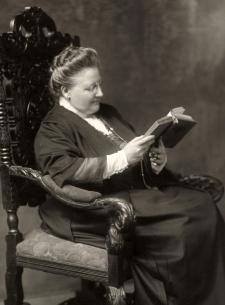
The Exeter Road
Panels of claret and blue which shine
Under the moon like lees of wine.
A coronet done in a golden scroll,
And wheels which blunder and creak as they roll
Through the muddy ruts of a moorland track.
They daren’t look back!
They are whipping and cursing the horses. Lord!
What brutes men are when they think they’re scored.
Behind, my bay gelding gallops with me,
In a steaming sweat, it is fine to see
That coach, all claret, and gold, and blue,
Hop about and slue.
They are scared half out of their wits, poor souls.
For my lord has a casket full of rolls
Of minted sovereigns, and silver bars.
I laugh to think how he’ll show his scars
In London to-morrow. He whines with rage
In his varnished cage.
My lady has shoved her rings over her toes.
‘Tis an ancient trick every night-rider knows.
But I shall relieve her of them yet,
When I see she limps in the minuet
I must beg to celebrate this night,
And the green moonlight.
There’s nothing to hurry about, the plain
Is hours long, and the mud’s a strain.
My gelding’s uncommonly strong in the loins,
In half an hour I’ll bag the coins.
‘Tis a clear, sweet night on the turn of Spring.
The chase is the thing!
How the coach flashes and wobbles, the moon
Dripping down so quietly on it. A tune
Is beating out of the curses and screams,
And the cracking all through the painted seams.
Steady, old horse, we’ll keep it in sight.
‘Tis a rare fine night!
There’s a clump of trees on the dip of the down,
And the sky shimmers where it hangs over the town.
It seems a shame to break the air
In two with this pistol, but I’ve my share
Of drudgery like other men.
His hat? Amen!
Hold up, you beast, now what the devil!
Confound this moor for a pockholed, evil,
Rotten marsh. My right leg’s snapped.
‘Tis a mercy he’s rolled, but I’m nicely capped.
A broken-legged man and a broken-legged horse!
They’ll get me, of course.
The cursed coach will reach the town
And they’ll all come out, every loafer grown
A lion to handcuff a man that’s down.
What’s that? Oh, the coachman’s bulleted hat!
I’ll give it a head to fit it pat.
Thank you! No cravat.
~They handcuffed the body just for style,
And they hung him in chains for the volatile
Wind to scour him flesh from bones.
Way out on the moor you can hear the groans
His gibbet makes when it blows a gale.
‘Tis a common tale.~
Amy Lowell
(1874 – 1925)
The Exeter Road
Poem
• fleursdumal.nl magazine
More in: Archive K-L, Archive K-L, Lowell, Amy
Op 20 februari 1909 luidt de Italiaanse dichter F.T. Marinetti met zijn futuristisch manifest in de Franse krant Le Figaro een nieuw artistiek tijdperk in.
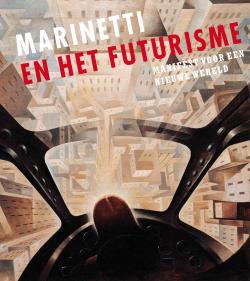 In het manifest bezingt hij de snelheid, de toekomst, agressiviteit en activisme, en wijst hij het verleden resoluut af. Deze ideële uitgangspunten spreken veel jonge kunstenaars en intellectuelen in Italië en Europa aan, waardoor Marinetti al snel een groep jonge futuristen om zich heen heeft verzameld. De futuristen dromen van een radicaal nieuwe toekomst, waarin geen plek is voor het verleden.
In het manifest bezingt hij de snelheid, de toekomst, agressiviteit en activisme, en wijst hij het verleden resoluut af. Deze ideële uitgangspunten spreken veel jonge kunstenaars en intellectuelen in Italië en Europa aan, waardoor Marinetti al snel een groep jonge futuristen om zich heen heeft verzameld. De futuristen dromen van een radicaal nieuwe toekomst, waarin geen plek is voor het verleden.
Hun avant-gardistische ideologie, in al zijn veelzijdigheid en complexiteit, groeide uit tot een voorbeeld voor de modernistische mentaliteit van de twintigste eeuw.
Tentoonstelling Marinetti en het Futurisme
nog t/m19 februari 2023
in Rijksmuseum Twenthe, Enschede
Lasondersingel 129-131, 7514 BP Enschede
T 053 2012000
Reguliere openingstijden
Dinsdag t/m zondag 10.00-17.00 uur
Catalogus bij de tentoonstelling:
Marinetti en het Futurisme
Uitgeverij Waanders
Nederlands
24 x 27 cm
80 pagina’s
60 illustraties
Paperback
ISBN 9789462623224
€ 23,95
• fleursdumal.nl magazine
More in: - Book News, Archive M-N, Archive M-N, Exhibition Archive, Futurism, Futurisme
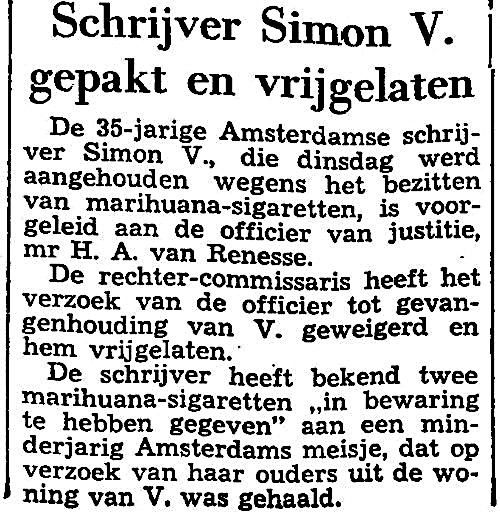
Simon Vinkenoog (1928 – 2009) was een Nederlands schrijver, dichter, vertaler en samensteller van bloemlezingen. Bovendien een groot liefhebber en kenner van seks, drugs en rock-‘n-roll.
Zijn fascinatie voor en kennis van hallucinogene middelen, bracht hem regelmatig in aanraking met justitie.
Een bericht uit Dagblad De Waarheid van zaterdag 21 december 1963.
Simon Vinkenoog
• fleursdumal.nl magazine
More in: Archive U-V, Archive U-V, Art & Literature News, DRUGS & DISEASE & MEDICINE & LITERATURE, Simon Vinkenoog, Simon Vinkenoog
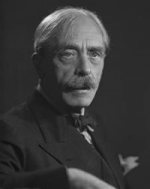
Féerie
La lune mince verse une lueur sacrée,
Toute une jupe d’un tissu d’argent léger,
Sur les bases de marbre où vient l’Ombre songer
Que suit d’un char de perle une gaze nacrée.
Pour les cygnes soyeux qui frôlent les roseaux
De carènes de plume à demi lumineuse,
Elle effeuille infinie une rose neigeuse
Dont les pétales font des cercles sur les eaux . . .
Est-ce vivre ?… Ô désert de volupté pâmée
Où meurt le battement faible de l’eau lamée,
Usant le seuil secret des échos de cristal . . .
La chair confuse des molles roses commence
À frémir, si d’un cri le diamant fatal
Fêle d’un fil de jour toute la fable immense.
Paul Valéry
(1871-1945)
Féerie
Poème
Album de vers anciens
• fleursdumal.nl magazine
More in: Archive U-V, Archive U-V, Valéry, Paul
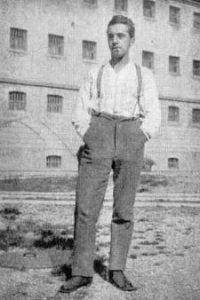
Ein Gefangener reicht dem Tod die Hand
Erst hörte man den Schrei der armen Kreatur.
Dann poltern Flüche durch die aufgescheuchten Gänge,
Sirenen singen die Alarmgesänge,
In allen Zellen tickt die Totenuhr.
Was trieb dich, Freund, dem Tod die Hand zu reichen?
Das Wimmern der Gepeitschten? Die geschluchzten Hungerklagen?
Die Jahre, die wie Leichenratten unsern Leib zernagen?
Die ruhelosen Schritte, die zu unsern Häuptern schleichen?
Trieb dich der stumme Hohn der leidverfilzten Wände,
Der wie ein Nachtmahr unsre Brust bedrückt?
Wir wissen’s nicht. Wir wissen nur, daß Menschenhände
Einander wehe tun. Daß keine Hilfebrücke überbrückt
Die Ströme Ich und Du. Daß wir den Weg verlieren
Im Dunkel dieses Hauses. Daß wir frieren.
Ernst Toller
(1893 – 1939)
Ein Gefangener reicht dem Tod die Hand
• fleursdumal.nl magazine
More in: Archive S-T, Archive S-T, Toller, Ernst
Thank you for reading Fleurs du Mal - magazine for art & literature